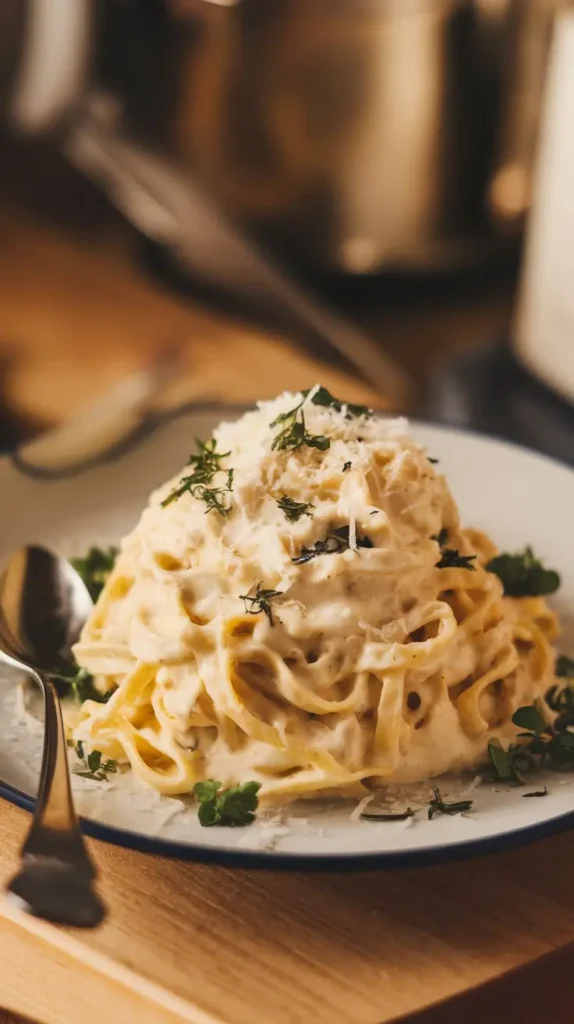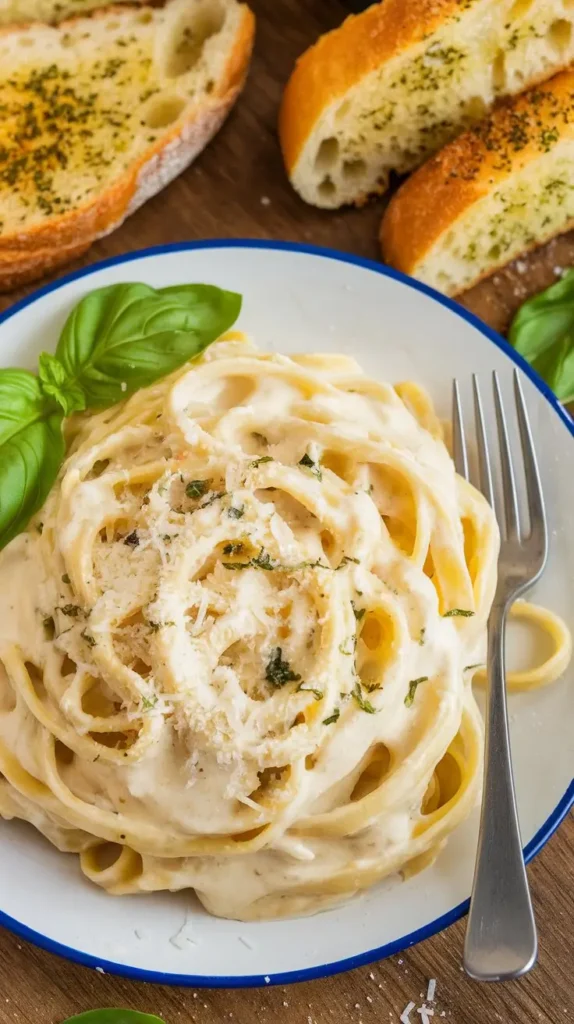Is it possible that one of the most comforting and widely loved foods is both quick to prepare and deeply satisfying—without coming loaded with grease or heaviness? Recent culinary surveys suggest that pasta dishes, particularly those featuring white sauce, are gaining favor among health-conscious home cooks across America who crave richness with a fresh twist. This white sauce pasta recipe brings explosion of creaminess and flavor while allowing room for creative customizations, challenging the notion that “creamy” always means “indulgent.” Dive into a world where white sauce pasta stands as a testament to uncomplicated pleasure, all crafted in your own kitchen.
Ingredients List
Great white sauce pasta starts with fresh, high-quality ingredients—each contributing to the final taste and texture. Here’s what you’ll need:
- Pasta: 12 ounces of penne, fusilli, or farfalle. Whole wheat or gluten-free options easily swap in for dietary preferences.
- Unsalted Butter: 3 tablespoons, for a luscious, silky base.
- All-Purpose Flour: 3 tablespoons, which thickens the sauce without overpowering.
- Whole Milk: 2 ½ cups, lending the sauce its creaminess. Oat milk or unsweetened almond milk works for a dairy-free touch.
- Heavy Cream: ½ cup, optional for an extra dose of richness.
- Grated Parmesan Cheese: ½ cup, adding nutty, umami depth.
- Fresh Garlic: 2-3 cloves, finely minced for aromatic lift.
- Salt & Freshly Cracked Black Pepper: To taste.
- Italian Seasoning: 1 teaspoon, or a blend of dried oregano and basil.
- Fresh Parsley: 2 tablespoons, chopped, for a burst of color.
- Olive Oil: 1 tablespoon, to sauté garlic if you prefer less butter.
- Vegetable Add-Ins (optional): Sliced mushrooms, spinach, sweet peas, cherry tomatoes, or bell peppers.
- Protein Additions (optional): Grilled chicken, shrimp, or tofu can all make it a fuller meal.
Substitution Highlights:
- Oat milk keeps the sauce dairy-free yet creamy.
- Swap Parmesan for nutritional yeast in a vegan version.
- Substitute spinach for kale for a different green.
Timing
Making this pasta rarely eats into your evening.
- Preparation: 10 minutes
- Cooking: 20 minutes
- Total Time: 30 minutes
Compared to more complex baked pasta recipes that regularly require over an hour, this method trims at least 20–30 minutes off the average prep without sacrificing taste or texture.

Step-by-Step Instructions
1. Cook the Pasta
Bring a large pot of salted water to a bubbling boil. Add your chosen pasta, stirring occasionally so it doesn’t stick. For perfectly al dente texture, cook it 1–2 minutes less than package directions. Reserve one cup of pasta water right before draining—this little detail ensures a silky-smooth sauce finish.
Tip: A generous pinch of salt in the boiling water seasons the pasta from the inside out.
2. Sauté Garlic
In a deep skillet or saucepan, melt the butter over medium heat. Add the finely minced garlic and stir gently until it’s fragrant but not browned—usually about a minute. If you want, combine butter with a splash of olive oil for added flavor depth.
Tip: Lower the heat if the garlic starts to color. Bitter notes can overshadow the sauce’s natural sweetness.
3. Form the Roux
Sprinkle in the flour, whisking continuously until you see no more white patches and a blond paste forms. This process should take no more than 1–2 minutes. The roux is what thickens your sauce and gives it that custardy mouthfeel.
Tip: Don’t walk away—flour burns quickly and ruins the subtle flavors.
4. Add Milk (Slowly)
Gently pour in the milk, one cup at a time, whisking after each addition to remove lumps. Once all the milk is incorporated, stir in the heavy cream if using. Keep whisking as the mixture comes to a gentle simmer and thickens noticeably.
Tip: Whole milk or plant-based options will mingle differently. Always whisk vigorously to create an even, luxurious texture.
5. Season and Cheese It Up
When the sauce is thick enough to coat the back of a spoon, add salt, pepper, the Italian seasoning or your custom blend, and finally, the grated Parmesan cheese. Stir until cheese melts and the sauce is glossy. Taste and adjust seasoning.
Pro Insight: Freshly cracked black pepper lifts cream sauces from flat to dynamic.
6. Combine Everything
Toss the drained pasta straight into the sauce, gently folding until the noodles are entirely coated. If the sauce seems too thick, add reserved pasta water a tablespoon at a time until you reach your desired silkiness.
Tip: Add vegetables or proteins now to warm them through and let flavors meld.
7. Plate and Garnish
Serve hot, topped with fresh parsley and extra cheese or a dusting of red pepper flakes.
Nutritional Information
Here’s an overview for a hearty serving (about 1/4 of this recipe):
| Nutrient | Amount | % Daily Value (approx.) |
|---|---|---|
| Calories | 520 | 26% |
| Total Fat | 24g | 36% |
| Saturated Fat | 13g | 65% |
| Protein | 17g | 34% |
| Carbohydrates | 56g | 19% |
| Fiber | 3g | 12% |
| Sodium | 700mg | 29% |
| Calcium | 320mg | 32% |
Actual nutrition varies with ingredient swaps and add-ins. Splitting this dish with extra vegetables or lean proteins tweaks the numbers in your favor.
Healthier Alternatives for the Recipe
White sauce pasta doesn’t have to be reserved for cheat days. These strategies pack flavor into a lighter, more nutritionally aware dish:
- Swap Dairy: Use unsweetened almond or oat milk with olive oil instead of butter.
- Skip Heavy Cream: Thicken with extra flour or puree soft tofu directly into the sauce.
- Reduce Cheese: Nutritional yeast mimics the umami of Parmesan with a powerful B-vitamin boost.
- Bulk with Vegetables: Add roasted broccoli, sautéed zucchini, or wilted greens to boost fiber and micronutrients.
- Lean Proteins: Grill chicken breast, shrimp, or tofu instead of relying solely on cheese and cream.
For vegan eaters, sub the butter with vegan margarine, ditch all cheese, and double the herbs for an aromatic finish.
Serving Suggestions
White sauce pasta pairs beautifully with a wide range of sides:
- Classic Caesar or Spinach Salad: Freshness cuts through the richness.
- Rustic Garlic Bread: Crunch and flavor in every bite.
- Roasted Vegetables: Carrots, asparagus, or brussels sprouts give color and nutrition.
- Sparkling Apple Cider or Light White Wine: Drinks that refresh without overwhelming.
Personalize each plate by serving in warmed bowls and finishing with a sprinkle of lemon zest or toasted walnuts for unexpected texture.
Common Mistakes to Avoid
Even seasoned cooks can trip up, especially with techniques that seem more forgiving than they really are. Common pitfalls include:
- Rushing the Roux: Uncooked flour leads to grainy, chalky sauce.
- Adding Cold Milk Too Quickly: Shock will create lumps—heat the milk gently first if you can.
- Overcooking the Sauce: Past the thickening point, it separates; stay vigilant.
- Heavy-Handed Seasoning: Start with less salt, then build. Cheese often brings saltiness.
- Ignoring Pasta Water: It’s your best friend for rescue and glossing up a too-thick sauce.
Sticking to the basics while making room for small, watchful adjustments delivers foolproof results.
Storing Tips for the Recipe
Leftovers save well with these guidelines:
- Cool Completely: Give the pasta a breather before stashing in an airtight container.
- Refrigerate: Stores for up to 3 days, keeping texture best if reheated gently (add a splash of milk to moisten).
- Freeze: Less ideal, as the sauce may split—add fresh cream while warming to revive.
- Prep Components: Make the sauce ahead, keeping it separate from the cooked pasta. Combine just before serving for freshest flavor.
Optimal storage means every bite still delivers the original creamy dream.
The rich, silky magic of white sauce pasta is absolutely doable at home—with just a handful of pantry items and half an hour. Let your kitchen fill with the aromas of garlic, butter, and fresh herbs while you cook a meal that feels both luxurious and nourishing. Try this recipe tonight and let us know how it transformed your dinner table! Drop your thoughts in the review section or comments below, and don’t forget to subscribe for more inspiring takes on timeless classics.
FAQs
Can I use pre-shredded cheese? Pre-shredded cheese contains anti-caking agents that can make the sauce grainy. Fresh grated cheese blends smoother and enhances flavor.
Is it possible to make this ahead? Yes, the sauce can be prepared up to 2 days in advance. Store it separately and heat gently before combining with cooked pasta for best results.
Can I add more vegetables? Absolutely! Sautée mushrooms, bell peppers, spinach, or zucchini before adding pasta for extra color and a nutrition boost.
What does pasta water do for the sauce? Starch-rich pasta water helps create a silky, cohesive sauce that clings beautifully to every noodle.
Is this recipe kid-friendly? Most kids enjoy the mild, creamy flavors. For picky eaters, omit pepper and blend in their favorite veggies or proteins.
For more answers or to share your own tips, leave a question in the comment section below!


